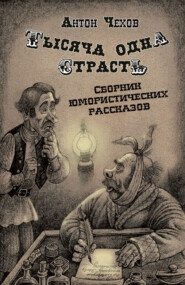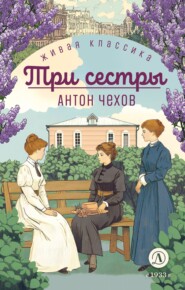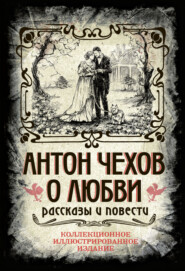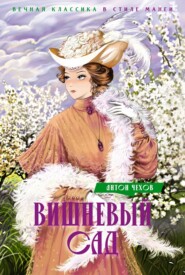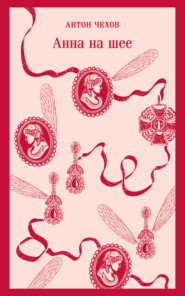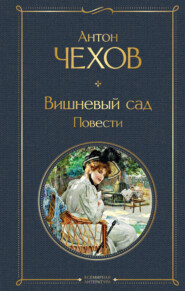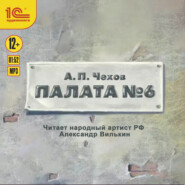По всем вопросам обращайтесь на: info@litportal.ru
(©) 2003-2025.
✖
The Lady with the Dog and Other Stories
Настройки чтения
Размер шрифта
Высота строк
Поля
Once when I was in a happy, dreamy mood, I asked her at dinner (we had soup and roast meat sent in from a restaurant every day):
"Polya, do you believe in God?"
"Why, of course!"
"Then," I went on, "you believe there will be a day of judgment, and that we shall have to answer to God for every evil action?"
She gave me no reply, but simply made a contemptuous grimace, and, looking that time at her cold eyes and over-fed expression, I realised that for her complete and finished personality no God, no conscience, no laws existed, and that if I had had to set fire to the house, to murder or to rob, I could not have hired a better accomplice.
In my novel surroundings I felt very uncomfortable for the first week at Orlov's before I got used to being addressed as "thou," and being constantly obliged to tell lies (saying "My master is not at home" when he was). In my flunkey's swallow-tail I felt as though I were in armour. But I grew accustomed to it in time. Like a genuine footman, I waited at table, tidied the rooms, ran and drove about on errands of all sorts. When Orlov did not want to keep an appointment with Zinaida Fyodorovna, or when he forgot that he had promised to go and see her, I drove to Znamensky Street, put a letter into her hands and told a lie. And the result of it all was quite different from what I had expected when I became a footman. Every day of this new life of mine was wasted for me and my cause, as Orlov never spoke of his father, nor did his visitors, and all I could learn of the stateman's doings was, as before, what I could glean from the newspapers or from correspondence with my comrades. The hundreds of notes and papers I used to find in the study and read had not the remotest connection with what I was looking for. Orlov was absolutely uninterested in his father's political work, and looked as though he had never heard of it, or as though his father had long been dead.
III
Every Thursday we had visitors.
I ordered a piece of roast beef from the restaurant and telephoned to Eliseyev's to send us caviare, cheese, oysters, and so on. I bought playing-cards. Polya was busy all day getting ready the tea-things and the dinner service. To tell the truth, this spurt of activity came as a pleasant change in our idle life, and Thursdays were for us the most interesting days.
Only three visitors used to come. The most important and perhaps the most interesting was the one called Pekarsky – a tall, lean man of five and forty, with a long hooked nose, with a big black beard, and a bald patch on his head. His eyes were large and prominent, and his expression was grave and thoughtful like that of a Greek philosopher. He was on the board of management of some railway, and also had some post in a bank; he was a consulting lawyer in some important Government institution, and had business relations with a large number of private persons as a trustee, chairman of committees, and so on. He was of quite a low grade in the service, and modestly spoke of himself as a lawyer, but he had a vast influence. A note or card from him was enough to make a celebrated doctor, a director of a railway, or a great dignitary see any one without waiting; and it was said that through his protection one might obtain even a post of the Fourth Class, and get any sort of unpleasant business hushed up. He was looked upon as a very intelligent man, but his was a strange, peculiar intelligence. He was able to multiply 213 by 373 in his head instantaneously, or turn English pounds into German marks without help of pencil or paper; he understood finance and railway business thoroughly, and the machinery of Russian administration had no secrets for him; he was a most skilful pleader in civil suits, and it was not easy to get the better of him at law. But that exceptional intelligence could not grasp many things which are understood even by some stupid people. For instance, he was absolutely unable to understand why people are depressed, why they weep, shoot themselves, and even kill others; why they fret about things that do not affect them personally, and why they laugh when they read Gogol or Shtchedrin… Everything abstract, everything belonging to the domain of thought and feeling, was to him boring and incomprehensible, like music to one who has no ear. He looked at people simply from the business point of view, and divided them into competent and incompetent. No other classification existed for him. Honesty and rectitude were only signs of competence. Drinking, gambling, and debauchery were permissible, but must not be allowed to interfere with business. Believing in God was rather stupid, but religion ought be safeguarded, as the common people must have some principle to restrain them, otherwise they would not work. Punishment is only necessary as deterrent. There was no need to go away for holidays, as it was just as nice in town. And so on. He was a widower and had no children, but lived on a large scale, as though he had a family, and paid three thousand roubles a year for his flat.
The second visitor, Kukushkin, an actual civil councillor though a young man, was short, and was conspicuous for his extremely unpleasant appearance, which was due to the disproportion between his fat, puffy body and his lean little face. His lips were puckered up suavely, and his little trimmed moustaches looked as though they had been fixed on with glue. He was a man with the manners of a lizard. He did not walk, but, as it were, crept along with tiny steps, squirming and sniggering, and when he laughed he showed his teeth. He was a clerk on special commissions, and did nothing, though he received a good salary, especially in the summer, when special and lucrative jobs were found for him. He was a man of personal ambition, not only to the marrow of his bones, but more fundamentally – to the last drop of his blood; but even in his ambitions he was petty and did not rely on himself, but was building his career on the chance favour flung him by his superiors. For the sake of obtaining some foreign decoration, or for the sake of having his name mentioned in the newspapers as having been present at some special service in the company of other great personages, he was ready to submit to any kind of humiliation, to beg, to flatter, to promise. He flattered Orlov and Pekarsky from cowardice, because he thought they were powerful; he flattered Polya and me because we were in the service of a powerful man. Whenever I took off his fur coat he tittered and asked me: "Stepan, are you married?" and then unseemly vulgarities followed – by way of showing me special attention. Kukushkin flattered Orlov's weaknesses, humoured his corrupted and blasé ways; to please him he affected malicious raillery and atheism, in his company criticised persons before whom in other places he would slavishly grovel. When at supper they talked of love and women, he pretended to be a subtle and perverse voluptuary. As a rule, one may say, Petersburg rakes are fond of talking of their abnormal tastes. Some young actual civil councillor is perfectly satisfied with the embraces of his cook or of some unhappy street-walker on the Nevsky Prospect, but to listen to him you would think he was contaminated by all the vices of East and West combined, that he was an honourary member of a dozen iniquitous secret societies and was already marked by the police. Kukushkin lied about himself in an unconscionable way, and they did not exactly disbelieve him, but paid little heed to his incredible stories.
The third guest was Gruzin, the son of a worthy and learned general; a man of Orlov's age, with long hair, short-sighted eyes, and gold spectacles. I remember his long white fingers, that looked like a pianist's; and, indeed, there was something of a musician, of a virtuoso, about his whole figure. The first violins in orchestras look just like that. He used to cough, suffered from migraine, and seemed invalidish and delicate. Probably at home he was dressed and undressed like a baby. He had finished at the College of Jurisprudence, and had at first served in the Department of Justice, then he was transferred to the Senate; he left that, and through patronage had received a post in the Department of Crown Estates, and had soon afterwards given that up. In my time he was serving in Orlov's department; he was his head-clerk, but he said that he should soon exchange into the Department of Justice again. He took his duties and his shifting about from one post to another with exceptional levity, and when people talked before him seriously of grades in the service, decorations, salaries, he smiled good-naturedly and repeated Prutkov's aphorism: "It's only in the Government service you learn the truth." He had a little wife with a wrinkled face, who was very jealous of him, and five weedy-looking children. He was unfaithful to his wife, he was only fond of his children when he saw them, and on the whole was rather indifferent to his family, and made fun of them. He and his family existed on credit, borrowing wherever they could at every opportunity, even from his superiors in the office and porters in people's houses. His was a flabby nature; he was so lazy that he did not care what became of himself, and drifted along heedless where or why he was going. He went where he was taken. If he was taken to some low haunt, he went; if wine was set before him, he drank – if it were not put before him, he abstained; if wives were abused in his presence, he abused his wife, declaring she had ruined his life – when wives were praised, he praised his and said quite sincerely: "I am very fond of her, poor thing!" He had no fur coat and always wore a rug which smelt of the nursery. When at supper he rolled balls of bread and drank a great deal of red wine, absorbed in thought, strange to say, I used to feel almost certain that there was something in him of which perhaps he had a vague sense, though in the bustle and vulgarity of his daily life he had not time to understand and appreciate it. He played a little on the piano. Sometimes he would sit down at the piano, play a chord or two, and begin singing softly:
"What does the coming day bring to me?"
But at once, as though afraid, he would get up and walk from the piano.
The visitors usually arrived about ten o'clock. They played cards in Orlov's study, and Polya and I handed them tea. It was only on these occasions that I could gauge the full sweetness of a flunkey's life. Standing for four or five hours at the door, watching that no one's glass should be empty, changing the ash-trays, running to the table to pick up the chalk or a card when it was dropped, and, above all, standing, waiting, being attentive without venturing to speak, to cough, to smile – is harder, I assure you, is harder than the hardest of field labour. I have stood on watch at sea for four hours at a stretch on stormy winter nights, and to my thinking it is an infinitely easier duty.
They used to play cards till two, sometimes till three o'clock at night, and then, stretching, they would go into the dining-room to supper, or, as Orlov said, for a snack of something. At supper there was conversation. It usually began by Orlov's speaking with laughing eyes of some acquaintance, of some book he had lately been reading, of a new appointment or Government scheme. Kukushkin, always ingratiating, would fall into his tone, and what followed was to me, in my mood at that time, a revolting exhibition. The irony of Orlov and his friends knew no bounds, and spared no one and nothing. If they spoke of religion, it was with irony; they spoke of philosophy, of the significance and object of life – irony again, if any one began about the peasantry, it was with irony.
There is in Petersburg a species of men whose specialty it is to jeer at every aspect of life; they cannot even pass by a starving man or a suicide without saying something vulgar. But Orlov and his friends did not jeer or make jokes, they talked ironically. They used to say that there was no God, and personality was completely lost at death; the immortals only existed in the French Academy. Real good did not and could not possibly exist, as its existence was conditional upon human perfection, which was a logical absurdity. Russia was a country as poor and dull as Persia. The intellectual class was hopeless; in Pekarsky's opinion the overwhelming majority in it were incompetent persons, good for nothing. The people were drunken, lazy, thievish, and degenerate. We had no science, our literature was uncouth, our commerce rested on swindling – "No selling without cheating." And everything was in that style, and everything was a subject for laughter.
Towards the end of supper the wine made them more good-humoured, and they passed to more lively conversation. They laughed over Gruzin's family life, over Kukushkin's conquests, or at Pekarsky, who had, they said, in his account book one page headed Charity and another Physiological Necessities. They said that no wife was faithful; that there was no wife from whom one could not, with practice, obtain caresses without leaving her drawing-room while her husband was sitting in his study close by; that girls in their teens were perverted and knew everything. Orlov had preserved a letter of a schoolgirl of fourteen: on her way home from school she had "hooked an officer on the Nevsky," who had, it appears, taken her home with him, and had only let her go late in the evening; and she hastened to write about this to her school friend to share her joy with her. They maintained that there was not and never had been such a thing as moral purity, and that evidently it was unnecessary; mankind had so far done very well without it. The harm done by so-called vice was undoubtedly exaggerated. Vices which are punished by our legal code had not prevented Diogenes from being a philosopher and a teacher. Cæsar and Cicero were profligates and at the same time great men. Cato in his old age married a young girl, and yet he was regarded as a great ascetic and a pillar of morality.
At three or four o'clock the party broke up or they went off together out of town, or to Officers' Street, to the house of a certain Varvara Ossipovna, while I retired to my quarters, and was kept awake a long while by coughing and headache.
IV
Three weeks after I entered Orlov's service – it was Sunday morning, I remember – somebody rang the bell. It was not yet eleven, and Orlov was still asleep. I went to open the door. You can imagine my astonishment when I found a lady in a veil standing at the door on the landing.
"Is Georgy Ivanitch up?" she asked.
From her voice I recognised Zinaida Fyodorovna, to whom I had taken letters in Znamensky Street. I don't remember whether I had time or self-possession to answer her – I was taken aback at seeing her. And, indeed, she did not need my answer. In a flash she had darted by me, and, filling the hall with the fragrance of her perfume, which I remember to this day, she went on, and her footsteps died away. For at least half an hour afterwards I heard nothing. But again some one rang. This time it was a smartly dressed girl, who looked like a maid in a wealthy family, accompanied by our house porter. Both were out of breath, carrying two trunks and a dress-basket.
"These are for Zinaida Fyodorovna," said the girl.
And she went down without saying another word. All this was mysterious, and made Polya, who had a deep admiration for the pranks of her betters, smile slyly to herself; she looked as though she would like to say, "So that's what we're up to," and she walked about the whole time on tiptoe. At last we heard footsteps; Zinaida Fyodorovna came quickly into the hall, and seeing me at the door of my room, said:
"Stepan, take Georgy Ivanitch his things."
When I went in to Orlov with his clothes and his boots, he was sitting on the bed with his feet on the bearskin rug. There was an air of embarrassment about his whole figure. He did not notice me, and my menial opinion did not interest him; he was evidently perturbed and embarrassed before himself, before his inner eye. He dressed, washed, and used his combs and brushes silently and deliberately, as though allowing himself time to think over his position and to reflect, and even from his back one could see he was troubled and dissatisfied with himself.
They drank coffee together. Zinaida Fyodorovna poured out coffee for herself and for Orlov, then she put her elbows on the table and laughed.
"I still can't believe it," she said. "When one has been a long while on one's travels and reaches a hotel at last, it's difficult to believe that one hasn't to go on. It is pleasant to breathe freely."
With the expression of a child who very much wants to be mischievous, she sighed with relief and laughed again.
"You will excuse me," said Orlov, nodding towards the coffee. "Reading at breakfast is a habit I can't get over. But I can do two things at once – read and listen."
"Read away… You shall keep your habits and your freedom. But why do you look so solemn? Are you always like that in the morning, or is it only to-day? Aren't you glad?"
"Yes, I am. But I must own I am a little overwhelmed."
"Why? You had plenty of time to prepare yourself for my descent upon you. I've been threatening to come every day."
"Yes, but I didn't expect you to carry out your threat to-day."
"I didn't expect it myself, but that's all the better. It's all the better, my dear. It's best to have an aching tooth out and have done with it."
"Yes, of course."
"Oh, my dear," she said, closing her eyes, "all is well that ends well; but before this happy ending, what suffering there has been! My laughing means nothing; I am glad, I am happy, but I feel more like crying than laughing. Yesterday I had to fight a regular battle," she went on in French. "God alone knows how wretched I was. But I laugh because I can't believe in it. I keep fancying that my sitting here drinking coffee with you is not real, but a dream."
Then, still speaking French, she described how she had broken with her husband the day before and her eyes were alternately full of tears and of laughter while she gazed with rapture at Orlov. She told him her husband had long suspected her, but had avoided explanations; they had frequent quarrels, and usually at the most heated moment he would suddenly subside into silence and depart to his study for fear that in his exasperation he might give utterance to his suspicions or she might herself begin to speak openly. And she had felt guilty, worthless, incapable of taking a bold and serious step, and that had made her hate herself and her husband more every day, and she had suffered the torments of hell. But the day before, when during a quarrel he had cried out in a tearful voice, "My God, when will it end?" and had walked off to his study, she had run after him like a cat after a mouse, and, preventing him from shutting the door, she had cried that she hated him with her whole soul. Then he let her come into the study and she had told him everything, had confessed that she loved some one else, that that some one else was her real, most lawful husband, and that she thought it her true duty to go away to him that very day, whatever might happen, if she were to be shot for it.
"There's a very romantic streak in you," Orlov interrupted, keeping his eyes fixed on the newspaper.
She laughed and went on talking without touching her coffee. Her cheeks glowed and she was a little embarrassed by it, and she looked in confusion at Polya and me. From what she went on to say I learnt that her husband had answered her with threats, reproaches, and finally tears, and that it would have been more accurate to say that she, and not he, had been the attacking party.
"Yes, my dear, so long as I was worked up, everything went all right," she told Orlov; "but as night came on, my spirits sank. You don't believe in God, George, but I do believe a little, and I fear retribution. God requires of us patience, magnanimity, self-sacrifice, and here I am refusing to be patient and want to remodel my life to suit myself. Is that right? What if from the point of view of God it's wrong? At two o'clock in the night my husband came to me and said: 'You dare not go away. I'll fetch you back through the police and make a scandal.' And soon afterwards I saw him like a shadow at my door. 'Have mercy on me! Your elopement may injure me in the service.' Those words had a coarse effect upon me and made me feel stiff all over. I felt as though the retribution were beginning already; I began crying and trembling with terror. I felt as though the ceiling would fall upon me, that I should be dragged off to the police-station at once, that you would grow cold to me – all sorts of things, in fact! I thought I would go into a nunnery or become a nurse, and give up all thought of happiness, but then I remembered that you loved me, and that I had no right to dispose of myself without your knowledge; and everything in my mind was in a tangle – I was in despair and did not know what to do or think. But the sun rose and I grew happier. As soon as it was morning I dashed off to you. Ah, what I've been through, dear one! I haven't slept for two nights!"
She was tired out and excited. She was sleepy, and at the same time she wanted to talk endlessly, to laugh and to cry, and to go to a restaurant to lunch that she might feel her freedom.
"You have a cosy flat, but I am afraid it may be small for the two of us," she said, walking rapidly through all the rooms when they had finished breakfast. "What room will you give me? I like this one because it is next to your study."
At one o'clock she changed her dress in the room next to the study, which from that time she called hers, and she went off with Orlov to lunch. They dined, too, at a restaurant, and spent the long interval between lunch and dinner in shopping. Till late at night I was opening the door to messengers and errand-boys from the shops. They bought, among other things, a splendid pier-glass, a dressing-table, a bedstead, and a gorgeous tea service which we did not need. They bought a regular collection of copper saucepans, which we set in a row on the shelf in our cold, empty kitchen. As we were unpacking the tea service Polya's eyes gleamed, and she looked at me two or three times with hatred and fear that I, not she, would be the first to steal one of these charming cups. A lady's writing-table, very expensive and inconvenient, came too. It was evident that Zinaida Fyodorovna contemplated settling with us for good, and meant to make the flat her home.
She came back with Orlov between nine and ten. Full of proud consciousness that she had done something bold and out of the common, passionately in love, and, as she imagined, passionately loved, exhausted, looking forward to a sweet sound sleep, Zinaida Fyodorovna was revelling in her new life. She squeezed her hands together in the excess of her joy, declared that everything was delightful, and swore that she would love Orlov for ever; and these vows, and the naïve, almost childish confidence that she too was deeply loved and would be loved forever, made her at least five years younger. She talked charming nonsense and laughed at herself.
"There's no other blessing greater than freedom!" she said, forcing herself to say something serious and edifying. "How absurd it is when you think of it! We attach no value to our own opinion even when it is wise, but tremble before the opinion of all sorts of stupid people. Up to the last minute I was afraid of what other people would say, but as soon as I followed my own instinct and made up my mind to go my own way, my eyes were opened, I overcame my silly fears, and now I am happy and wish every one could be as happy!"
But her thoughts immediately took another turn, and she began talking of another flat, of wallpapers, horses, a trip to Switzerland and Italy. Orlov was tired by the restaurants and the shops, and was still suffering from the same uneasiness that I had noticed in the morning. He smiled, but more from politeness than pleasure, and when she spoke of anything seriously, he agreed ironically: "Oh, yes."
"Stepan, make haste and find us a good cook," she said to me.
"There's no need to be in a hurry over the kitchen arrangements," said Orlov, looking at me coldly. "We must first move into another flat."






